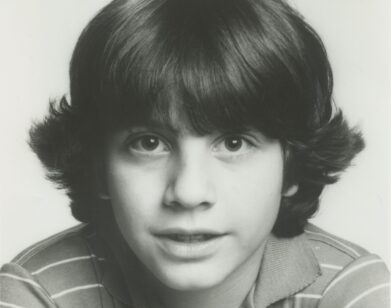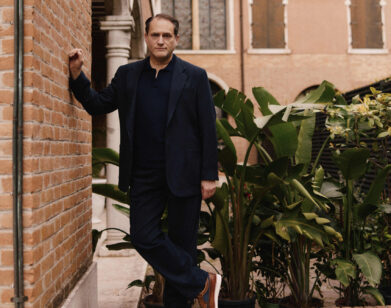Penny Lane and The American President

ABOVE: OUR NIXON DIRECTOR PENNY LANE. PHOTO BY LUISA OPALESKY
“I don’t like pointing cameras at people. I really like research,” says Penny Lane, the director of Our Nixon. Lane’s new documentary came about when she, along with co-producer Brian Frye, discovered 26 hours of Super 8 home movies taken by Richard Nixon’s aides John Ehrlichman, H.R. Haldeman, and Dwight Chapin sitting unseen in the National Archives. “For me, the best kind of art project is the kind where you’re like, ‘How come no one’s done this before? It seems so obvious,'” says Lane.
After viewing the footage, Lane and Frye set about assembling the images into a narrative that traverses the Nixon presidency from the moon landing, to China, to—inevitably—the Watergate scandal. “There are things about history you can’t get from doing an interview with somebody. We wanted the film to be experiential,” says Lane. The resulting documentary is an impressionistic look at the Nixon presidency and a humanizing study of his closest confidants. “This is about the men with the cameras, and what it’s like to see their world literally through their eyes,” she says.
Asked what she learned about Nixon himself, Lane says she was surprised by the humanity behind Nixon’s media-warped persona. “It’s easy to forget that these historical figures were people. Without realizing it, I think that Oliver Stone’s Nixon had really influenced my image of what those people acted like. In that world, they’re always in dark rooms planning criminal conspiracies—like, that’s all they did,” she laughs. Interview caught up with Lane to discuss the film, the reaction to it by the media (including Nixon speechwriter and television personality Ben Stein), and why so many people find Richard Nixon fascinating long after his presidency.
NATHAN REESE: Why do you suppose no one had used the footage before you and Brian decided to look into it?
PENNY LANE: I think the home movies were kind of forgotten. They weren’t about Watergate, and I think when most people went to go look at Nixon materials in the National Archive they were almost exclusively looking for materials about Watergate. People still have a lot of questions about Watergate; it’s still kind of mysterious. So, because they had nothing to do with Watergate, they just kind of slipped out of the consciousness of the researchers who worked there. The films were there, and they were technically available for anybody to see, but they were not in a format that would let anyone see them. So we paid to have the video transfers made so that we and other researchers could actually watch them.
REESE: What did you expect to find on the footage once you converted it?
LANE: Because Brian and I had both made a lot of films using archival imagery and home movies especially, we know something about what home movies feel like and what they look like and what they kind of do narratively. The range of home movie images is boring — mostly boring — to adorable. That’s the range. Home movies are either adorable or they’re boring.
REESE: It’s hard to think of the Nixon White House as “adorable.”
LANE: Well, we knew that because of the context of these home movies that those same boring/adorable images would have some kind of inherent conflict or inherent irony or kitsch value that would be interesting, but we had no idea what kind of movie we were going to make. Initially we thought it would be more about Nixon than it actually is. When we got the home movies we instantly were like, this is about his aides.
REESE: How much did you know his aides and Nixon before you started making the film?
LANE: I think I knew your average educated person’s amount of Nixon/Watergate stuff. I didn’t know anything about his aides. I mean, I had heard Haldeman and Ehrlichman’s names, but not Chapin—I’d never even heard of Chapin. But I’d heard of them in this kind of one-dimensional stock-villain way. I knew what they looked like and how they were talked about by the press as these stern, stone-walling, grey, Germanic bad guys. “Henchmen” is a word that I think was used a lot to describe them. But I didn’t know anything about them beyond, again, that caricature.
REESE: What surprised you most about seeing the aides in the informal setting of the home videos?
LANE: How young they were—how young everyone looked! Not just our three main characters, but all the staffers. It was so not what I pictured. I didn’t know anything about what a White House staff looks like, and perhaps they’re always that young, but they looked like babies to me. But the initial feelings were kind of in the area of cognitive dissonance. H.R. Haldeman is the best example. To have this stock, scowling, brush-cut guy, and there he is and he’s always smiling. And he’s always goofing around and he’s wearing Bermuda shorts. How is this the person that I’ve grown up with this image of? It doesn’t fit at all.
REESE: It’s unthinkable now, to imagine staff members walking around a modern White House with cameras. Why was the context of these guys being able to film so freely?
LANE: Super 8 had just been invented—this was like iPhone 5, the newest, coolest technology. These were the kind of guys who would have those cameras for their own personal lives, for their kids, for Christmas, whatever. They struck an agreement with the Naval Photographic Center, which was in charge of documenting the presidency officially. The Navy would pay for all the film and pay for all the processing, because they knew they’d be at historic places that maybe no one else would be at. They were doing it partly because they were bored, or because they wanted something to show their grandkids, but also specifically for posterity.
REESE: While the images haven’t been seen before, the audio—taken from the White House tapes—is something that people are more familiar with. How did you go about matching the soundless images with the audio?
LANE: Slowly, and with much debate. The way we made the film was important. Most documentary filmmakers go into an archive with a story they already know they want to tell and they find material that illustrates that story. That is not how we made this film; we were as open-minded as we could possibly be. We just watched [the movies]. The process was the same for the tapes. We listened to a lot of tapes with no real criteria, and slowly started to build criteria because we felt what the tapes were telling us was a particular story, and we wanted to honor that story. We wanted to know, what was the relationship like between these men? Was it nice? Was it mean? Was it abusive? Was it brotherly? We wanted to express the human range of what we had experienced listening to the human tapes without any bias.
REESE: What was the biggest takeaway you got from listening to all that audio?
LANE: The overwhelming impression that we had of the tapes was one of an extremely humanizing force. People tend to think that the Nixon tapes equal criminality, and for good reason: the tapes were the reason that Nixon resigned. But when you listen to the almost 4,000 hours of tapes, only a very small portion has to do with criminality. The vast majority is sort of like the home movies—it alternates between boring and hilarious. It’s just life. They’re just sitting there talking.
REESE: I was actually struck but how I went into the film with certain preconceptions and left actually feeling slightly sorry for these guys, or at least understanding where they were coming from.
LANE: The only people that watch his film and complain that it was too one-sided are themselves just way far out in agenda-land. You have to be a pretty rabid Nixon fan to think that this is an anti-Nixon film. And you have be pretty rabidly anti-Nixon to believe this is a pro-Nixon film. We were just trying to avoid that whole question. We were trying to make it more confusing, not less confusing. There was good, there was bad, there was a whole bunch of stuff going on during that time that [people] try to flatten and make simple. And it wasn’t simple.
REESE: The film certainly does a nice job showing Nixon’s accomplishments along with the scandals.
LANE: You tend to forget about his accomplishments. The people who complain that the film isn’t enough about his accomplishments… I’m like, [we show] the Apollo moon landing, China, the speeches that were very popular. Anything that seemed novel or new to us, we kind of privileged.
REESE: Of the three, Chapin is the only of the three aides still living. What was his reaction to seeing the film?
LANE: He’s had a bunch of different reactions to it. He wants to make sure everyone knows that he does not consider this to be his Nixon. He’s extremely concerned with what he sees as a historical bias toward Nixon-bashing. And I think he looks at the film and does a tally in his head—pro-Nixon, anti-Nixon—and I think he thinks that there’s too many anti-Nixon things, or something. I think his point of view is valid and in a lot of ways he’s right—that a lot of Nixon’s policy initiatives have been overshadowed by Watergate. And I agree that that is too bad. But my goal in life is not to rehabilitate Nixon’s image. His goal in life is. What I thought was surprising was that, in all the conversations that we’ve had about it, he hasn’t noticed—or doesn’t care —that audiences like him and empathize with him. He doesn’t notice that the movie is about him, and not Nixon.
REESE: Once decision that has been particularly controversial is the inclusion of audio of a homophobic rant by Nixon regarding All in the Family.
LANE: That was the most debated scene in the whole film, because we didn’t want it to read as a cheap shot. It’s really easy to take cheap shots against Nixon. And that’s pretty much all anyone has ever done with the White House tapes. Every time there’s a release of new tapes, there’s a bunch of news stories where they pull out all of the most disgusting things—whether it’s racist or sexist or anti-Semitic or homophobic. But there are a couple things in that conversation that we couldn’t let go of. One, it was a conversation between him and his aides. And we were trying to get at what that relationship was like. And it was very illuminating listening to him ranting about this thing and have them be just like, “That’s right! The Greeks! Everyone knows!” There’s this very yes-man relationship that they’re having. The second thing was their discussion of All in the Family, which they didn’t really know what it was, and it was a very popular show. It illustrated something about their isolation from popular culture and the mainstream in a sense. They’re kind of in a bubble. Ehrlichman’s never heard of it. Nixon thinks it’s a movie. Only Haldeman knew what it was, and no one knows what it’s called. It’s just very funny.
REESE: What reactions to the film have surprised you the most?
LANE: A couple people have said that it’s one-sided, which boggles my mind. I can’t think of a less one-sided movie about Richard Nixon. The one criticism that I can’t take is that. I’m like, “I don’t think you watched it—come on!” It almost hurts my feelings. It goes against the entire mission of the film and all the careful work we put into it to make it not one-sided. And a couple people, like Ben Stein, have just been lying.
REESE: I read his Daily Beast piece.
LANE: Yeah, it’s just full of lies. He’s lying in order to call me a liar. Call me naïve, but I haven’t had a lot of experience with the press. Does nobody fact-check? How do people just get to lie? That bothered me.
REESE: So that sort of attention has been a shock to you.
LANE: It’s been very surprising. When Brian and I started this film, our intentions were what they are today: pretty modest. We aren’t trying to rewrite history. I don’t think we expected to have the amount of interest that we’ve had. What I didn’t get was the extent to which that man is so fascinating to so many people for so many different reasons. I’m glad that the film is about a lot of different things, because it allows people with different obsessions with Nixon to come to it with whatever that obsession is. I’m not from that generation, and neither is Brian. We failed to anticipate the intensity of feeling that this film was going to provoke. We were coming at it with a tremendous amount of distance. We were surprised to discover what a live issue this still is for so many people.
OUR NIXON ORIGINALLY AIRED ON CNN. THE FILM IS IN THEATERS TODAY. FOR MORE ON THE DOCUMENTARY, VISIT ITS WEBSITE.






